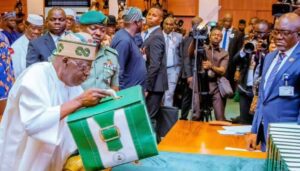
No recruitment scandal In ECOWAS Parliament, says member
The Economic Community of West African States (ECOWAS) Parliament has debunked the allegation by some Nigerian lawmakers on recruitment irregularities at the institution.
Sen. Edwin Snowe, Leader of the Liberian Delegation at the Parliament, said this while speaking with the Parliamentary correspondents on Sunday in Abuja.
Snowe was reacting to the outrage that erupted over the alleged recruitment irregularities process on ECOWAS.
Nigeria NewsDirect reports that Nigerians Lawmakers had threatened to pull out of the Parliament alleging that Nigerians were being shortchanged in its recruitment exercise.
The Nigerian delegation also threatened to withdraw the country’s membership of the regional bloc if it refused to suspend the ongoing recruitment exercise as recently directed in the 2022 First Ordinary Session of the ECOWAS Parliament in Abuja.
Snowe, however, refuted the allegation describing it as “ a misrepresentation” of the real issues by the Nigerian delegation, stressing that the recruitment process at the Parliament was competitive.
He also said that the Nigeria delegation that raised the alleged scandal were filibustering to impress Nigerians so as to canvass for votes ahead of the 2023 general elections in Nigeria.
“Recruitment into the ECOWAS institutions is very competitive and cannot shortchange any country let alone Nigeria that has made invaluable contributions to the development of the community.
“There was no resolution reached at the plenary to suspend recruitment into the P5 positions as is being insinuated by Nigerian legislators. Nigerians are adequately represented in ECOWAS Parliament and other institutions of the community,” Snowe said.
Regarding the recruitment, Snowe insisted that the report of a resolution to suspend the recruitment process was not true.
He explained that a motion was entertained by the First Deputy Speaker who was the presiding officer on the issues raised by Nigerian MPs on Nigerians being shortchanged.
Snowe said the issue of recruitment was being handled by a Nigerian firm contracted by the Community to take applications and shortlist successful citizens of the sub-region for interview and wondered why Nigerian lawmakers are crying foul.
He added that the matter was referred to the Bureau for further action, adding that it does not constitutes a resolution to suspend the process as the whole community activities could not be stopped because some lawmakers from a member country raised issues.
“There was no vote taken on this matter, two Nigerian lawmakers raised the issue about the recruitment process.
“There was this staff skill audit that was done at ECOWAS and the results came out not too favorable to some of the staff occupying certain positions. So, the lawmakers linked the staff skill audit debate to the recruitment process.
“But the Deputy Speaker asked the Bureau to take seize of the matter and investigate it and get back to the Parliament’s Plenary at the earliest possible time.
“There was no vote taken because resolution at Parliament is based on vote,” Snowe further explained.
Snowe said that apart from the P1 to P3 positions which were junior cadre, there was no record of recruitment into the P5 positions, which was the bone of contention, as no decision had been reached on it.
He further explained that the recruitment for the P5 position was within the jurisdiction of the Management Succession Committee( MSC) of the ECOWAS Commission which was chaired by the President of the Commission.
He pointed out that the regional bloc recognised the immense contributions of Nigeria and had taken steps to give Nigeria adequate representation in ECOWAS institutions.
“At the Parliament as I speak to you, there are 73 staff members and 35 of them are Nigerians.
“We breached the Rule of Procedure, we breached the Supplementary Act and gave Nigeria a deserving platform at the Parliament.
“This consideration made is not out of weakness, it is out of our own appreciation for the role Nigeria has played in our sub-region.
“For Example at the Authority of Heads of State and Government the chairmanship is rotational. At the Parliament, the Speakership is rotational on alphabetical order.
“But on our own, outside the Protocol – the Supplementary Act of the Parliament, outside our standing rule, we have agreed that when Nigeria is not chairing as Speaker, Nigeria should always serve as First Deputy Speaker even when there is no rule that supports that.
“Each country has a committee chair at the Parliament currently with the exception of Guinea Bissau.
“We also said that because of Nigeria’s magnanimity we have given Nigeria two committee chairmen positions because of our respect for what tax payers money has done for the region.
“Nigeria permanently chairs the Finance Committee and and another committee in addition to the First Deputy Speaker when Nigeria is not serving as Speaker,” Snowe noted.
He cautioned the Nigerian lawmakers not to cast unnecessary aspersions on the Parliament and its Speaker Sidie Tunis by misrepresenting of facts.
“ECOWAS was founded on solidarity, there is nothing that makes might right in the community. The Nigerian delegation questioning the recruitment process is misrepresenting the decisions that emanate from the plenary.
“I understand that our brothers are going for election and sometimes they filibustering because they want the vote and support of their constituencies to feel that they represent Nigeria’s interest at the Parliament.
“But we will not allow the Parliament to be used as a stepping stone for the reelection of politicians,” Snowe added.
Nigerian representatives at the parliament issued the threat when some principal officers in the regional bloc allegedly defied the directives and embarked on the illegal process of recruiting their relatives and cronies.
The lawmakers cite the huge financial commitments which Nigeria makes to the body amid its internal security challenges.
They alleged that there was no commensurate return on investment for Nigeria in ECOWAS for all the country has done and is doing for the region from its inception in 1975.



